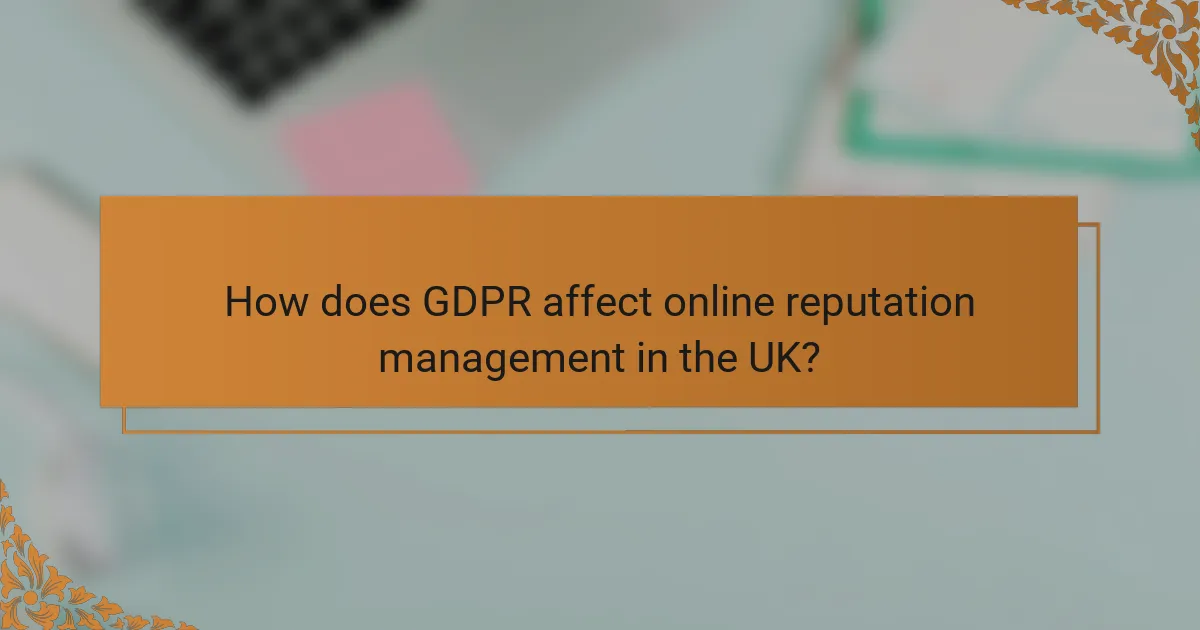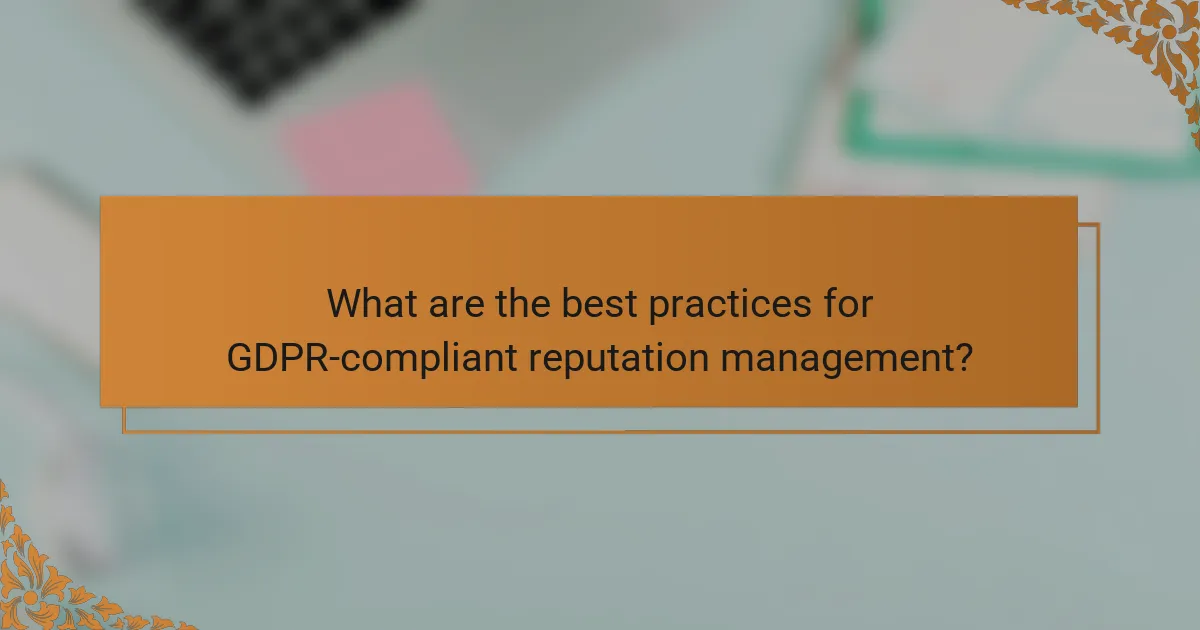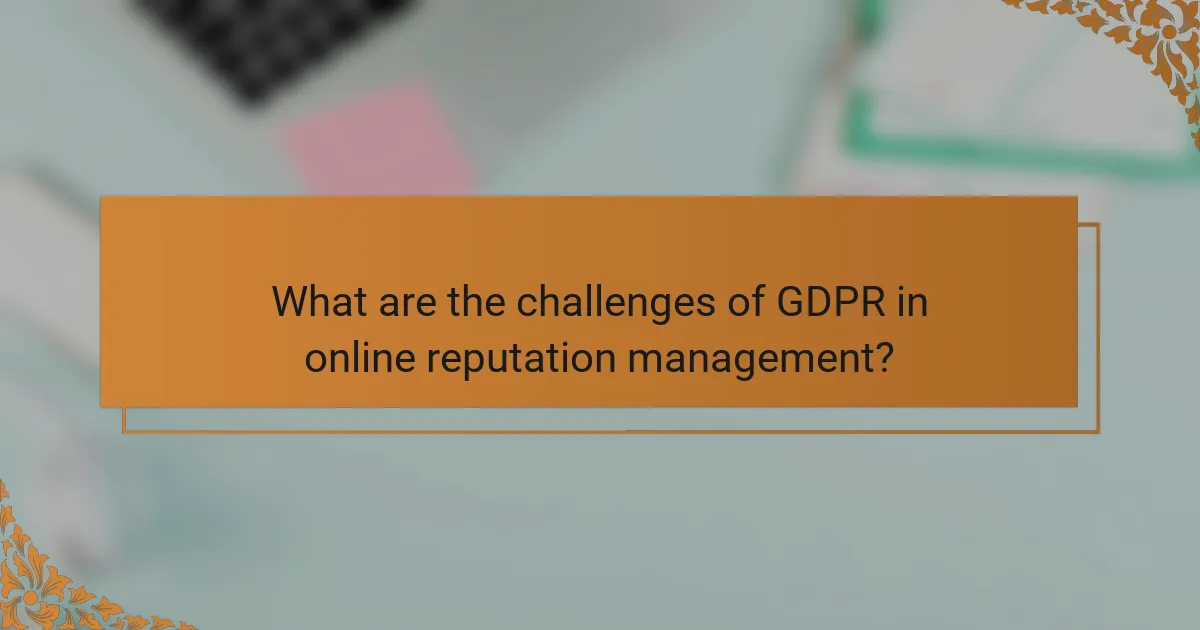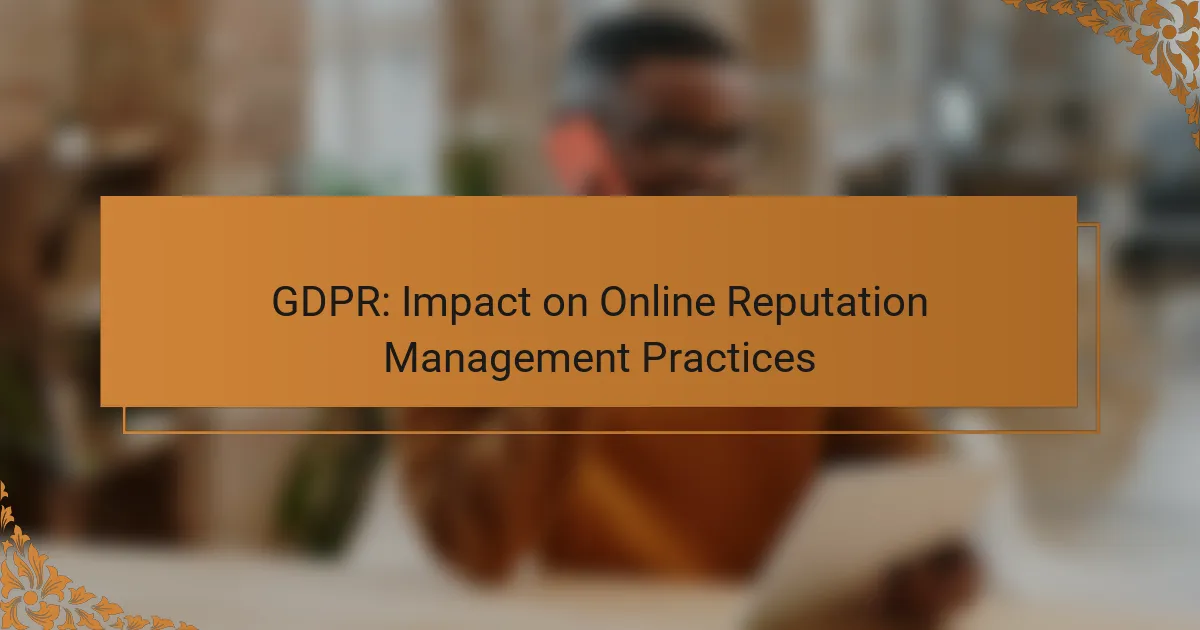The General Data Protection Regulation (GDPR) has transformed online reputation management (ORM) by imposing stringent requirements on data privacy and user consent. Organizations must balance their efforts to maintain a positive online presence with the need to respect individuals’ rights regarding personal information. By prioritizing transparency and compliance, businesses can effectively navigate these challenges while enhancing their ORM strategies.

How does GDPR affect online reputation management in the UK?
The General Data Protection Regulation (GDPR) significantly impacts online reputation management (ORM) in the UK by enforcing stricter rules on data privacy and user consent. Businesses must navigate these regulations carefully to maintain their online presence while respecting individuals’ rights regarding their personal information.
Increased accountability for data handling
GDPR mandates that organizations demonstrate accountability in how they handle personal data. This means that businesses must implement clear data protection policies and maintain records of data processing activities. Failure to comply can lead to substantial fines, which can reach up to 4% of annual global turnover.
For ORM, this increased accountability means that companies must be transparent about how they collect, store, and use customer data. Regular audits and staff training on data protection practices are essential to ensure compliance and build trust with users.
Stricter consent requirements for user data
Under GDPR, obtaining user consent for data processing must be explicit, informed, and freely given. This means that businesses can no longer rely on pre-ticked boxes or implied consent. Users must actively agree to data collection practices, which can affect how ORM strategies are developed.
For effective ORM, companies should create clear and concise consent forms that outline what data is being collected and how it will be used. Providing users with easy options to withdraw consent at any time is also crucial to comply with GDPR and maintain a positive reputation.
Impact on content removal requests
GDPR grants individuals the right to request the removal of their personal data, commonly known as the “right to be forgotten.” This has significant implications for ORM, as businesses must have processes in place to handle such requests promptly and effectively.
When managing online reputation, companies should establish clear protocols for responding to content removal requests. This includes verifying the identity of the requester and assessing the legitimacy of the request. Failure to comply can lead to reputational damage and potential legal consequences.

What are the best practices for GDPR-compliant reputation management?
To effectively manage online reputation while adhering to GDPR, organizations should prioritize transparency, consent, and regular audits. These practices ensure that personal data is handled responsibly and that individuals’ rights are respected.
Implement transparent data policies
Transparent data policies are essential for GDPR compliance in reputation management. Organizations must clearly inform users about what data is collected, how it is used, and who it is shared with. This can be achieved through easily accessible privacy notices and terms of service.
Consider using straightforward language and examples to explain data practices. For instance, if you collect customer reviews, specify how these reviews will be used and whether they will be published publicly. This builds trust and encourages user engagement.
Utilize consent management tools
Consent management tools are vital for obtaining and managing user permissions regarding their personal data. These tools allow users to opt-in or opt-out of data collection practices, ensuring compliance with GDPR requirements. Implementing a clear consent mechanism can help avoid potential fines.
Choose tools that provide easy-to-use interfaces for users to manage their preferences. For example, a pop-up that asks for consent before collecting data can be effective. Regularly review and update consent records to maintain compliance and transparency.
Regularly audit online presence
Conducting regular audits of your online presence helps identify and mitigate potential GDPR compliance issues. This involves reviewing all platforms where personal data may be displayed or stored, including social media, websites, and third-party services.
Establish a routine schedule for audits, such as quarterly or bi-annually. During these audits, check for outdated information, ensure that consent is properly documented, and assess the effectiveness of your data policies. This proactive approach can help maintain a positive online reputation while adhering to legal standards.

How can businesses adapt their strategies post-GDPR?
Businesses can adapt their strategies post-GDPR by prioritizing compliance while enhancing their online reputation management practices. This involves implementing proactive monitoring, improving communication with customers, and utilizing data analytics to gain valuable insights.
Focus on proactive reputation monitoring
Proactive reputation monitoring involves continuously tracking online mentions and reviews to identify potential issues before they escalate. Businesses should use tools that alert them to new content related to their brand, allowing for timely responses.
Consider setting up Google Alerts or using specialized reputation management software to keep tabs on your online presence. Regularly reviewing social media channels and customer feedback can help businesses stay ahead of negative sentiment.
Enhance customer communication
Enhancing customer communication is crucial for maintaining a positive online reputation. Businesses should ensure transparency in their interactions and be responsive to customer inquiries and complaints.
Implementing a clear feedback loop, such as surveys or direct outreach, can help businesses understand customer concerns and address them effectively. Regular updates about how customer data is handled under GDPR can also build trust.
Leverage data analytics for insights
Leveraging data analytics allows businesses to gain insights into customer behavior and sentiment, which can inform reputation management strategies. Analyzing trends in customer feedback can help identify areas for improvement.
Utilize analytics tools to track engagement metrics and sentiment analysis across various platforms. This data can guide content creation and customer interaction strategies, ensuring they align with audience expectations and preferences.

What tools support GDPR compliance in reputation management?
Several tools can assist in ensuring GDPR compliance within online reputation management practices. These tools help organizations manage consent, monitor online presence, and listen to social media conversations while adhering to privacy regulations.
OneTrust for consent management
OneTrust is a leading platform for managing user consent and privacy preferences. It allows businesses to create customizable consent banners and manage user data requests efficiently. By integrating OneTrust, organizations can ensure they are obtaining explicit consent for data processing, which is a key requirement under GDPR.
When using OneTrust, consider setting up automated workflows for handling consent changes and user requests. This can streamline compliance efforts and reduce the risk of non-compliance penalties.
SEMrush for online monitoring
SEMrush offers comprehensive tools for monitoring online reputation, including tracking brand mentions and analyzing search engine results. This platform helps businesses understand how they are perceived online and identify any negative content that may affect their reputation.
Utilizing SEMrush can help organizations respond promptly to negative reviews or misinformation. Regularly monitoring brand mentions allows for proactive reputation management, which is essential for maintaining a positive online presence in a GDPR-compliant manner.
Brand24 for social listening
Brand24 is a powerful social listening tool that enables businesses to track conversations about their brand across various social media platforms. This tool provides insights into customer sentiment and helps identify potential issues before they escalate.
By leveraging Brand24, companies can engage with their audience and address concerns directly, fostering a positive reputation. Additionally, understanding social media trends can aid in crafting GDPR-compliant communication strategies that respect user privacy while enhancing brand image.

What are the challenges of GDPR in online reputation management?
The General Data Protection Regulation (GDPR) presents several challenges for online reputation management, primarily by imposing strict rules on how personal data can be collected, stored, and used. Organizations must navigate these regulations while striving to maintain and enhance their online image, often leading to conflicts between privacy rights and reputation needs.
Balancing privacy with reputation needs
Balancing privacy with reputation management requires careful consideration of individual rights under GDPR. Businesses must ensure that any actions taken to improve their online reputation do not infringe on users’ privacy or consent rights. For instance, while responding to negative reviews can enhance reputation, companies must obtain permission before using any personal data associated with those reviews.
To effectively manage this balance, organizations should develop clear policies that respect user privacy while allowing for necessary reputation management activities. This may include anonymizing data or using aggregated insights to inform strategies without compromising individual identities.
Managing user data across platforms
Managing user data across various platforms is a significant challenge under GDPR, as organizations must ensure compliance with data protection standards wherever data is processed. This includes understanding the specific requirements of each platform and how they handle user data. For example, social media platforms may have different policies regarding data retention and user consent.
To streamline data management, companies can implement centralized data governance frameworks that monitor compliance across all platforms. Regular audits and updates to data handling practices can help mitigate risks associated with non-compliance and enhance overall reputation management efforts.
Adapting to evolving regulations
Adapting to evolving regulations like GDPR requires ongoing education and agility within organizations. As privacy laws continue to change, businesses must stay informed about new requirements and adjust their practices accordingly. This may involve training staff on compliance issues and revising policies to reflect the latest legal standards.
Organizations should also engage with legal experts to ensure that their reputation management strategies align with current regulations. Proactive adaptation not only helps avoid penalties but also builds trust with users, reinforcing a positive online reputation.

What future trends will shape GDPR and reputation management?
Future trends in GDPR and reputation management will likely revolve around enhanced data protection measures and the integration of advanced technologies. Organizations will need to adapt their strategies to comply with evolving regulations while effectively managing their online presence.
Increased focus on AI-driven analytics
The use of AI-driven analytics in reputation management is becoming increasingly important as businesses seek to understand consumer sentiment and behavior. These tools can analyze vast amounts of data from social media, reviews, and other online sources to provide insights into public perception.
Companies should consider implementing AI solutions that comply with GDPR regulations, ensuring that personal data is handled responsibly. For example, anonymizing user data can help maintain privacy while still allowing for effective analysis.
To leverage AI-driven analytics effectively, organizations should regularly review their data practices and ensure transparency with users about how their information is used. This approach not only enhances compliance but also builds trust with customers.
